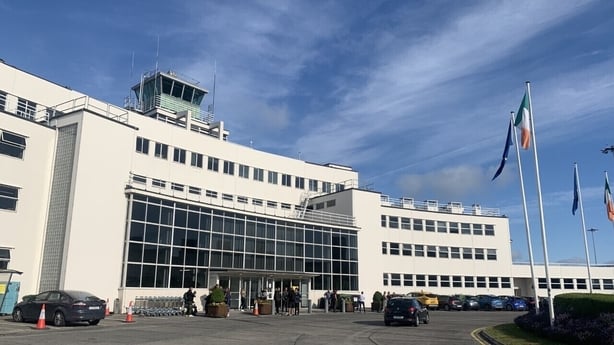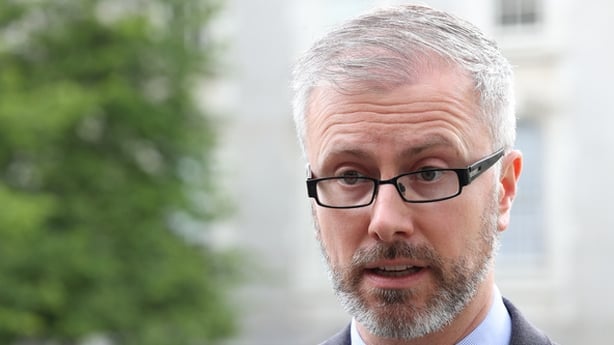The Citywest transit hub in Dublin is the first port of call for most newly arrived asylum seekers and Ukranian refugees.
The Department of Children, Equality, Disability, Integration and Youth said it is "nearing capacity".
In truth the converted conference centre has been operating beyond capacity since the summer at least.
There are 370 beds there and 18 showers at the facility and yet the numbers staying there regularly reach somewhere between 500 and 750, with people sleeping on chairs and on floors as a result.
When the Department said "nearing capacity" it means it has become more overcrowded still.
Though the numbers fluctuate there are currently around 800 people there, and the Department has raised the prospect of "a pause on entry to new arrivals to Citywest."
Its exact words were it "cannot be discounted."
What does that mean?
Well, it has meant two different things when it happened twice before.
The first time was in July when the Old Terminal Building at Dublin Airport was opened to accommodate Ukranian refugees and asylum seekers from other countries on air mattresses and on the floor over a couple of nights.

The second time it happened was last month when several asylum seekers slept rough on the streets of Dublin city.
They were among 201 newly arrived male asylum seekers who were offered nothing by way of accommodation over the course of a week from the 1-8 September.
The Irish Refugee Council described it as "unprecedented" and turned their offices into a daytime shelter for dozens of affected asylum seekers until accommodation was once again made available in Citywest.
The warning that something along either of these lines may once again be on the cards formed part of a press release announcing a U-turn on a plan to move 135 Ukrainian refugees from Killarney, Co Kerry to Co Mayo.
The news was met with tears of joy in Killarney where the families have made friends, where the children attend schools and where the adults have found employment.
It is clearly good news for those families and those who campaigned on their behalf to keep them within the community they have come to call home.
However, speaking to an Oireachtas Committee, Minister for Children, Equality, Disability, Integration and Youth Roderic O'Gorman said he could not "make a guarantee" that something like that would happen again.
Indeed, this is not the first time that Ukrainian families have been told they would be moved from a location where they had put down roots.

Last month RTÉ's John Cooke broke the story that 15 Ukranian families were given less than 48 hours' notice that they were to be moved from houses in Portlaoise, Co Laois where the adults were working and their children were going to school, to holiday homes in rural Kilkenny.
Despite local support for the refugees who wanted to stay, the decision to move them was not reversed.
And it is not just Ukrainian refugees who have had to deal with such upheaval.
Families with children in local schools were also moved, some out of county, when the Crowne Plaza hotel in Blanchardstown, Dublin ceased to offer accommodation to international protection applicants, or asylum seekers, on 31 August.
Speaking about the decision not to move Ukrainian refugees out of Killarney this week, Minister O'Gorman said: "we will try and avoid situations like this, because I am acutely aware that would have been traumatising for families", but he added that the incident was "an indication of the real pressures and the difficulties associated with having to accommodate so many people in short periods of time."
The 135 Ukrainian refugees who were living the Hotel Killarney have been moved to alternative accommodation in the town.
Hotel Killarney is already accommodating new residents, 200 male asylum seekers, who moved there in recent days.
RTÉ News spoke to one of them, a man who was recently moved from the Citywest transit hub where he had spent a month sleeping on chairs.
Another group of up to 130 women and children are arriving at the hotel today, moved from a temporarily repurposed office building where they were staying in Dublin.
According to the latest figures, the Department of Children, Equality, Integration, Disability and Youth is responsible for providing accommodation to 55,000 people, between those fleeing Ukraine and International Protection applicants.
That is more than the population of Waterford city, and it compares to just 7,500 people last year, made up of people in direct provision.
Across civil society there is an acceptance that these are extraordinary times, and that people within the Department are working extremely hard to find solutions.
The Irish Refugee Council described the Department as "overburdened" while the Ukraine Civil Society Forum called its efforts "herculean".
Nevertheless, there is also growing unease with the situation that is unfolding.
The Ukraine Civil Society Forum said what happened in Killarney was "a symptom of an approach focused on bed management... and a wider policy... that neglects long term planning."
The Irish Refugee Council has called for a "whole-of-government" approach to address "plummeting standards in accommodation" for asylum seekers.
While the Irish Human Rights and Equality Commission has said that "in spite of unprecedented demands ... the Government must honour their commitments to ensure the proper reception conditions of those coming to Ireland... and deliver a system which is not on a permanent emergency footing."







